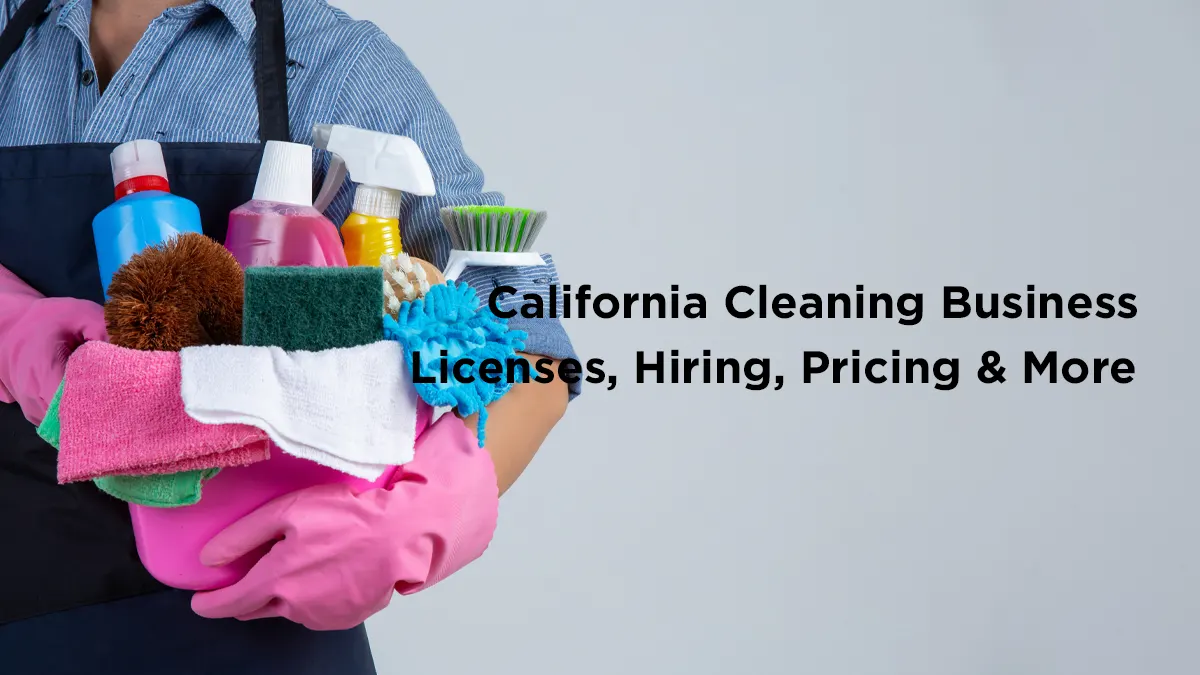Introduction
California presents a great opportunity to start a cleaning business given the growing demand for cleaning services in the state.
According to industry research, the cleaning industry is projected to grow by 3% annually nationwide over the next five years.
This comprehensive guide covers key steps like choosing a business structure, obtaining licenses, creating a business plan, finding clients, hiring staff, purchasing equipment, and pricing services.
Whether you want to operate as a sole proprietor or build a large cleaning company, this guide provides actionable advice to help aspiring entrepreneurs start a successful cleaning business in California.
Choosing a Business Structure
When starting a cleaning business in California, you must choose a business structure that complies with state laws. Here are a few options to consider along with the pros and cons of each.
For small cleaning businesses, a sole proprietorship is the most straightforward structure – you operate under your name with no legal distinction between you as an individual and the business.
The pros are easy and inexpensive formation, complete control, and easy taxes. The cons are unlimited personal liability and difficulty raising investment capital.
A partnership allows you to share ownership of a cleaning business with one or more partners. You can divide up roles, responsibilities, profits, and losses.
Partnerships are relatively easy to establish and allow you to combine skills and capital with partners.
However, they come with unlimited personal liability and the potential for disagreements between partners.
A limited liability company (LLC) provides liability protection for owners while allowing pass-through taxation.
In an LLC, the owners pay taxes on profits and can deduct losses on their tax returns, since no separate business entity is created.
The pros of an LLC are personal liability protection, less paperwork than a corporation, and flexible ownership. The cons are self-employment taxes and more complexity than a sole proprietorship.
Pros and Cons of Sole Proprietorship
A sole proprietorship provides the simplest option for structuring a cleaning business, with no divide between your personal and business affairs. You own and manage the company while operating under your name.
Pros:
- Easy and inexpensive to form
- Complete control over decisions
- Easy tax preparation
Cons:
- Unlimited personal liability
- Harder to raise investment capital
Pros and Cons of Partnership
A partnership allows you to share ownership of the business with a partner. You can divide roles and share profits/losses.
Pros:
- Easy to establish
- Shared capital, skills, and expertise
Cons:
- Unlimited personal liability
- Potential for disagreements
Pros and Cons of Limited Liability Company (LLC)
An LLC provides personal liability protection while allowing pass-through taxation. Owners are called members.
Pros:
- Personal liability protection
- Less recordkeeping than a corporation
- Flexible ownership
Cons:
- Self-employment taxes
- More complex than a sole proprietorship
Pros and Cons of Corporation
A corporation is a distinct legal entity from its owners. Shareholders have limited liability but face double taxation.
Pros:
- Increased credibility
- Ownership is transferrable
- Limited personal liability
Cons:
- More complex
- Double taxation of profits
Registering Your Business
To formally register a cleaning business in California, you must complete a few key steps. First, obtain local and state business licenses which are required to legally operate.
Business license fees are typically under $100. You’ll also need tax IDs like an Employer Identification Number (EIN) if hiring employees or forming an LLC/corporation.
Apply for sales tax permits as well through the State Board of Equalization. If operating under a DBA, register it with the county clerk’s office.
Always check local zoning regulations for any office-based operations.
Important points:
- Obtain local and state business licenses
- Get tax IDs like an EIN
- Register your DBA if using a name different than your name
- Check local zoning regulations
Creating a Business Plan
A solid business plan is crucial when starting a cleaning business in California. It allows you to map out your strategy, objectives, and financial projections.
Key components include an executive summary, company description, market analysis, competitive analysis, operations plan, financial projections, and SWOT analysis.
Invest time in creating a thoughtful business plan, as it can help attract investors, partners, and clients needed for success.
Important points:
- Executive summary
- Company description
- Market analysis
- Competitive analysis
- Operations plan
- Financial projections
- SWOT analysis
Getting Required Licenses
There are several licenses and permits needed to legally operate a cleaning business in California.
These include local business licenses, sales tax permits, insurance licenses like general liability and workers’ comp, cleaning service licenses, bonding, and background checks.
Proper licensing establishes credibility and shows you operate a legitimate business. Failing to obtain the required licenses can lead to significant issues and penalties down the line.
Important points:
- Business License
- Sales tax permit
- Insurance licenses
- Cleaning service license
- Bonding
- Background checks
Finding Clients
An effective client acquisition strategy is vital for any new cleaning business.
Useful tactics include having a search-optimized website, building a social media presence on platforms like Facebook and Instagram, printing marketing materials to distribute locally, networking at community events, getting customer referrals, and using paid advertising like Google/Facebook ads.
Delivering remarkable service leads to word-of-mouth referrals, which are often the best source of new clients for a cleaning business.
Important points:
- Search optimized website
- Social media presence
- Printed marketing materials
- Networking and referrals
- Paid online and print ads
Pricing Your Services
When starting a cleaning business in California, take time to research pricing for similar services in your local market. You can offer hourly rates (e.g. $25 per hour) or per-project pricing (e.g. $130 per apartment).
Have different packages and add-ons to meet varying customer needs. Offer new customer discounts but avoid significantly underpricing. Deliver exceptional service and results that justify your pricing.
Set competitive prices in line with your local market:
- Hourly versus per-project pricing
- Offer packages and add-ons
- Give new customer discounts
- Avoid underpricing
Deliver value that commands the prices you set.
Hiring Staff
Carefully consider whether to bring on employees versus using subcontractors. Employees allow more oversight for training and quality control. You can also build a company culture with consistent staffing.
However, employees come with payroll taxes, labor law compliance, and other obligations. Subcontractors offer flexibility and lower overhead costs, though less control. Thoroughly vet and train any staff entering client homes.
Consider hiring employees versus using subcontractors:
Employees:
- More control over training and quality
- Build company culture
- Must handle payroll taxes and labor laws
Subcontractors:
- Lower overhead costs
- Flexible scheduling
- Less liability
Thoroughly screen and train any staff that enter client homes.
Purchasing Equipment
Invest in commercial-grade equipment to outfit your cleaning business. Essentials include vacuums, mops, dusters, cleaning carts and supplies. Buy supplies in bulk from distributors for cost savings.
Have uniforms, badges, and branded gear for professionalism. Use scheduling, billing, and accounting software to streamline operations. Quality equipment enables staff to deliver excellent results efficiently.
Important points:
- Cleaning tools and carts
- Uniforms and branding
- Bulk cleaning supplies
- Scheduling and billing software
Quality equipment improves productivity and results.
Scaling Your Business
Once established, look for ways to scale up your cleaning business in California. As demand grows, hire additional staff. Offer complementary services like carpet cleaning or window washing.
Consider franchising opportunities once you’ve built an effective system. Expanding to multiple locations can help you service an entire region.
Conclusion
California’s booming cleaning industry creates promising opportunities for new cleaning businesses.
This guide outlined steps like choosing a business structure, obtaining licenses, creating a business plan, marketing, hiring staff, purchasing equipment, and pricing services.
By thoroughly planning each step and dedicating the required effort, you can establish a profitable cleaning business in California. Use this advice to turn your entrepreneurial dreams into reality.
Frequently Asked Questions about Starting a Cleaning Business in California
1. Do you need a license to be a house cleaner in California?
Yes, you need a business license and a cleaning service license in most cities.
2. Is the cleaning business profitable in the USA?
Yes, the cleaning industry is booming and profitable nationwide. There is strong demand.
3. Is cleaning a good business to start?
Yes, cleaning has low start-up costs and strong recurring revenue potential.
4. What type of cleaning business makes the most money?
Commercial cleaning services generally have the highest revenue potential.
5. How much does a house cleaner make in California?
$25-$35 per hour on average. Income varies based on number of clients.
6. Do you need qualifications to be a cleaner?
No formal education is required but on-the-job training is important.
7. What are the 3 types of cleaning?
Residential, commercial, and specialty cleaning services.
8. What are the threats of a cleaning company?
Competition, poor employee conduct, not vetting clients, underbidding jobs.
9. Are cleaning products profitable?
Yes, there is good markup potential for eco-friendly and specialty formulations.
10. Who buys cleaning products the most?
Women between 20-60 years old are the top purchasers.
11. What is the best way to sell cleaning products?
Online and social media marketing work well. In-person demos and parties too.
12. What is the average profit margin for a cleaning business?
40-50% profit margins are common for successful cleaning companies.



